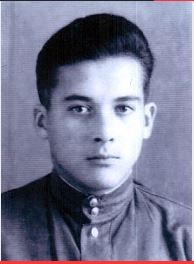Naum Sloushch was born in 1923 in Minsk. His father Samuil was a supplier to the city's "Button Artel" – a cooperative of artisans producing buttons, combs, and other similar goods. His mother Polina was a salesperson at a grocery store. The family was Yiddish-speaking. In 1937, Naum finished a seven-year school and went to work at a factory as a mechanic's apprentice.
On June 22, 1941, the Soviet-German War broke out. The Sloushch family failed to evacuate; Naum's parents and his younger brother remained in the city, and in July they were incarcerated in the Minsk Ghetto. Naum tried repeatedly to escape from the ghetto (his first attempt took place on November 6, 1941, in anticipation of a Nazi murder operation). However, he was able to flee into the woods only in June 1943. He spent many days wandering through the forest in search of Soviet partisans. He eventually met them, and was assigned to a unit that was part of the "Ponomarenko" Partisan Brigade. However, five days later the Germans launched an anti-partisan operation. Sloushch survived the "blockade" and acquired some combat experience.
In June 1944, the brigade was merged into the regular Red Army. Naum Sloushch was attached to the 2nd Belorussian Front as a rifleman; with it, he went through Western Belorussia and northern Poland. On the border of East Prussia, Sloushch was severely wounded in the spinal cord, and was in danger of quadriplegia (i.e., almost total paralysis of the body), losing the use of his arms and legs. Sloushch spent the subsequent two years in military hospitals. In his last hospital, he began to develop his paralyzed arms and legs through strenuous exercise. Every day, he would walk for hours with crutches under his armpits (being unable to hold them in his hands), pushing himself to the point of exhaustion; he also trained his hands. After a long time, he somehow managed to walk and perform simple manual tasks, at least with his left hand. In 1946, he was discharged from the hospital, a disabled man. All of his extended family – his parents, brother, grandfather, and all his uncles and aunts with their children – had perished in the Minsk Ghetto.
In the course of the war, Sloushch was awarded several medals, including "To a Partisan of the Patriotic War" and "For Courage".
After the war, Naum Sloushch worked at a garment factory in Minsk, serving as manager of the technical storage. He married and had children. He was able to do some agricultural work at his dacha (summer house), and was even confident enough to swim in the lake. He died in 2001.







